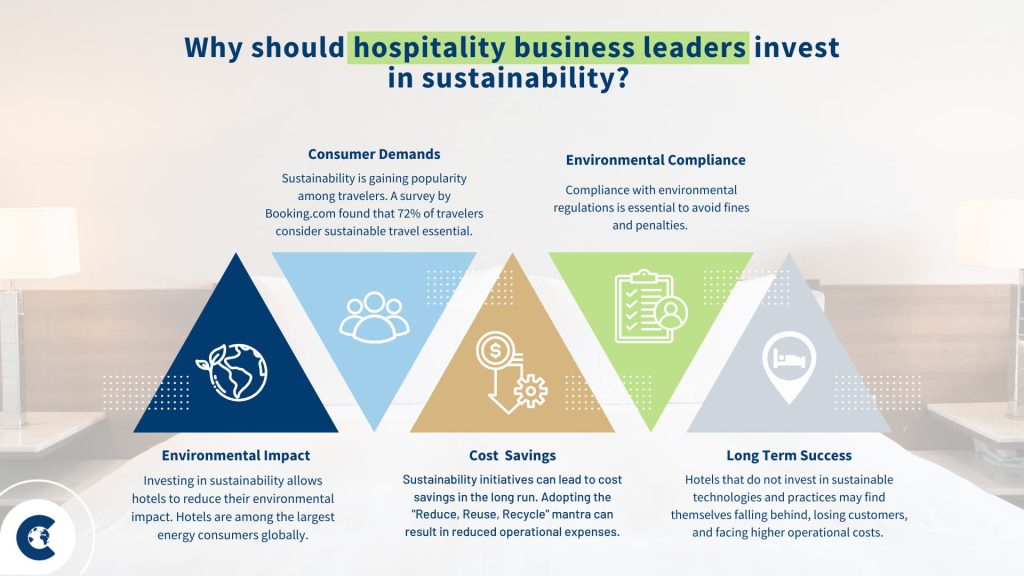Hospitality business leaders must prioritize climate action at the core of their operations to ensure long-term sustainability and address urgent environmental challenges facing the industry.
World Tourism Day 2023 is a call to action to the international community to unite around the future of tourism. In celebration of this global awareness event we are focusing this week’s article on why committing to climate action is crucial and how the global hospitality industry can embed it right into the heart of their core business operations.
Climate change 101 for hospitality management
Let’s start by understanding the fundamentals of climate change, because this is essential for equipping busy hospitality business leaders with the knowledge they need to make informed decisions. The scientific consensus is that human activities are the primary drivers of Earth’s recent warming trends. Factors such as the burning of fossil fuels, deforestation, and other human actions have led to a rapid surge in greenhouse gas (GHG) emissions in the atmosphere.
These gasses, including carbon dioxide, methane, and nitrous oxide, act like a blanket, trapping heat near the Earth’s surface and causing global temperatures to rise. The consequences are undeniable, with carbon dioxide levels having surged by more than 30% since the industrial revolution. This surge has resulted in a global temperature increase of approximately 0.2 degrees Celsius per decade, with current mean surface temperatures standing approximately 1.0 degrees Celsius warmer than the pre-industrial era.

The answer lies in the far-reaching impacts of even moderate climate alterations. These changes are set to have dramatic and damaging consequences, touching every corner of the globe. Already, climate change is manifesting itself through an increase in the frequency and severity of natural disasters, from floods and hurricanes to wildfires and droughts, all directly linked to this global temperature change.
For hospitality businesses, the consequences of climate change could be significant, extending across industries and global borders. From disrupted supply chains due to extreme weather events to heightened insurance costs and labor challenges, the impacts are tangible and costly. As highlighted by Deloitte Insights, at least 80 airports worldwide could face submersion if sea levels rise just one meter. This alone illustrates the pressing need for the hospitality sector to engage with climate change proactively.
Why is sustainability a problem within the hospitality industry?
Sustainability poses significant challenges within the industry, some of the most pressing are:
1. The growing issue of climate change is a concern because end-consumers are increasingly demanding eco-friendly practices from hotels and accommodations.
This demand necessitates adjustments within the industry to meet consumers’ expectations for sustainable operations. Failure to do so could result in losing business to competitors who have embraced sustainability, highlighting the economic repercussions of not aligning with these evolving consumer values.
2. Upcoming legislation aimed at environmental protection presents a complex problem for the hospitality industry. Non-compliance with such legislation may lead to fines and penalties, generating additional costs and potentially ruining a company’s reputation. As governments worldwide ramp up their efforts to combat climate change, hospitality businesses must not only adapt to meet legal requirements but also find ways to do so while maintaining their profitability and brand integrity.
3. The challenge of measuring scope 3 emissions is difficult to manage in the pursuit of sustainability within the hospitality sector. This issue arises because the industry lacks direct control over the carbon footprint of its providers and guests. The inability to fully measure and manage these emissions makes it difficult to construct a comprehensive sustainability plan, affecting the industry’s commitment to achieving net-zero emissions.

Why should hospitality business leaders invest in sustainability?
1. Investing in sustainability allows hotels to reduce their environmental impact. Hotels are among the largest energy consumers globally, and embracing sustainable technologies and practices can lead to significant reductions in energy consumption and carbon emissions.
2. Sustainability is gaining popularity among travelers. A survey by Booking.com found that 72% of travelers consider sustainable travel essential, with 53% willing to pay more for eco-friendly accommodations. Investing in sustainability not only attracts environmentally conscious guests but also sets hotels apart in a competitive market.
3. Sustainability initiatives can lead to cost savings in the long run. Adopting the “Reduce, Reuse, Recycle” mantra for waste management and energy efficiency measures can result in reduced operational expenses. Moreover, governments are increasingly offering incentives, such as grants and tax breaks, to businesses that adopt sustainable practices, which can further enhance a hotel’s financial prospects.
4. Compliance with environmental regulations is essential to avoid fines and penalties. Hotels that proactively invest in sustainability are more likely to meet these regulations and may even receive government incentives. Failure to do so can lead to legal issues and increased costs.
5. Sustainability is key to a hotel’s long-term success. Hotels that do not invest in sustainable technologies and practices may find themselves falling behind, losing customers, and facing higher operational costs. In an era where customer and employee expectations are driving the industry toward responsible environmental and social practices, sustainability is not just a choice but a strategic imperative for hotels looking to thrive in the future.
Creating a culture of sustainability and building a value-driven workforce
In the highly competitive labor market of the hospitality industry, building a value-driven workforce has become not just an aspiration but a strategic necessity. Hotels that demonstrate a strong commitment to corporate sustainability often find themselves with a distinct edge in employee engagement, retention, and recruitment. Today’s workers are increasingly seeking purpose and meaning in their jobs, and when they can connect their roles to a larger cause like sustainability, it develops a deeper sense of job satisfaction and loyalty. This alignment of personal values with organizational values encourages employees to stay with a company that shares their commitment to making a positive impact on the environment and society.
However, authenticity is key when it comes to engaging employees in sustainability efforts. Staff members expect to see concrete actions and measurable results rather than empty promises. To motivate and engage the workforce effectively, corporate values should be consistently demonstrated, from the boardroom to the front lines. Employees can serve as powerful brand ambassadors, but this credibility hinges on the company’s ability to uphold its sustainability commitments throughout the organization.
In essence, the key to building a value-driven workforce in the hospitality industry is not just articulating a commitment to sustainability but actively involving employees in sustainable and socially responsible behaviors. By engaging and motivating staff through meaningful sustainability initiatives, hotels can create a culture that attracts, retains, and inspires talent, ultimately reinforcing their competitive advantage in the labor market.

Lessons that can be learned from youth activists
Youth climate activists are teaching us invaluable lessons about addressing the climate crisis. They exemplify proactive engagement by taking immediate action in their communities, showcasing unwavering commitment, and leveraging innovative tools and technologies to amplify their message globally. These activists also engage in candid dialogues with governments, challenging traditional approaches, and emphasizing the importance of seizing the present moment. Their actions highlight the urgency of the climate crisis and remind us that waiting for permission or formal roles in sustainability is a luxury we can no longer afford.
At Climate Week NYC, Michael J. Nyenhuis, Chief Executive Officer and President of UNICEF USA, delivered a compelling message about the impact of youth activists. He said:
“When they find their voice and a platform to use it, the rest of us are compelled to listen.”
Nyenhuis went on to acknowledge the remarkable power of youth voices in demanding action from those in positions of authority.

“As powerful as these youth voices have been in requesting—and demanding—action from those in power, I have been equally moved lately by concrete actions taken by youth to address the climate crisis, often starting in their own communities. Increasingly, it is no longer their voices alone they are raising, but—impatient for action—they are now putting their own hands and feet to work.”
There are two points we can take away from this. Firstly, the youth activists who are vocal today will soon become the hotel guests of tomorrow, and their demand for immediate climate action leaves no room for complacency; those who fail to act will lag behind in meeting their expectations. Secondly, when young individuals with limited resources are already making a meaningful impact, it underscores the responsibility of hospitality businesses, equipped with ample resources and expertise, to prioritize sustainability and climate consciousness in their operations.
How Hospitality business leaders can commit to climate action
Hospitality management can play a significant part by not only reducing their own carbon footprint but also by involving their guests in sustainable initiatives. One effective way to engage guests in climate action is by offering them the opportunity to neutralize the carbon footprint of their vacation. This approach empowers travelers to become more responsible and eco-conscious during their trips. In today’s world, eco-conscious travelers are actively seeking opportunities to minimize their environmental impact, and this desire goes beyond mere travel trends; it has become a lifestyle choice.
ClimateTrade’s innovative API provides an accessible and seamless way for businesses to integrate climate action into their core operations. Whether it’s embedding climate action options into the online booking process or facilitating it at the front desk during check-in, this technology empowers hospitality businesses to engage guests in the fight against climate change.
Climate action involves investing in global initiatives that reduce greenhouse gas emissions, support renewable energy projects, and promote sustainable practices worldwide. But most importantly, it must be transparent and trustworthy. ClimateTrade’s blockchain-based climate action platform ensures transparency by directly channeling the funds to project developers, guaranteeing that every contribution goes directly toward initiatives that have a meaningful and verifiable impact on the environment. Ready to learn more? Download our ebook on Integrated Carbon Offsetting for Hotels.







